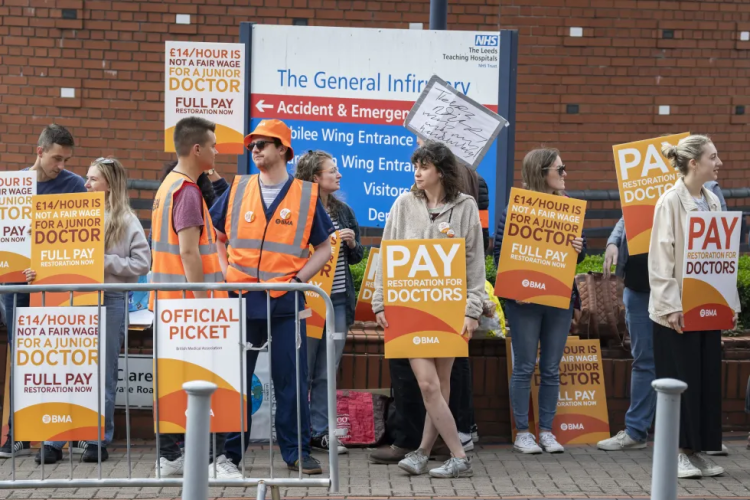LONDON (AP) — The pay dispute between tens of thousands of doctors in Britain’s state-funded health service and the government remains unresolved, prompting the doctors’ union to announce another round of strikes. Following a recent five-day walkout, which marked the longest in the history of the National Health Service, early-career doctors in England are planning to stage another walkout from August 11th to August 15th.
Dr. Robert Laurenson and Dr. Vivek Trivedi, co-chairs of the British Medical Association’s junior doctors’ committee, expressed their disappointment, stating that it was regrettable that they had to resort to a fifth round of strike action to address the issues at hand. The doctors hope that this ongoing industrial action will draw attention to their concerns and lead to a resolution with the government.
The co-chairs of the British Medical Association’s junior doctors’ committee, Dr. Robert Laurenson and Dr. Vivek Trivedi, reiterated their message, emphasizing that the key to avoiding further strikes lies with the government. They called on the government to act responsibly, engage in genuine negotiations with the doctors in good faith, and present a credible offer. By doing so, they believe that the strikes can be averted altogether, leading to a productive and satisfactory resolution to the pay dispute.
Around 75,000 junior doctors in the United Kingdom are demanding a 35% pay increase to bring their salaries back to 2008 levels, accounting for inflation. However, the government has offered only a 6% raise with an additional consolidated increase, and Prime Minister Rishi Sunak has stated that further discussions will not take place.
Similar to other European nations, the UK is grappling with disruptive strikes as various workers, including teachers, train drivers, and nurses, advocate for wages that keep up with the steep rise in consumer prices.
The ongoing strike by junior doctors, who handle much of the essential work in hospitals and endure long working hours, is expected to worsen the already beleaguered state of the healthcare service. Over the past eight months, industrial action in England has resulted in 819,000 postponed appointments, operations, and procedures, according to the NHS.
The issue of pay disputes with the government is not limited to junior doctors; other groups within the NHS are also embroiled in similar conflicts. For instance, radiographers initiated a 48-hour strike in hospitals across England, and senior doctors, known as consultants, conducted their first walkout in more than a decade last week. The widespread discontent among healthcare professionals highlights the urgent need for a resolution to ensure the smooth functioning of the health system.
“We will not be demoralized or divided by the prime minister’s actions,” stated Laurenson and Trivedi firmly in response to the government’s approach.
Earlier this month, the government offered pay increases to several public sector workers, including teachers, resulting in the cancellation of their strike action. Teachers received a 6.5% increase in their case.
The series of strikes occurring across Britain has been fueled by the emergence of high inflation, an unprecedented development in recent years. The surge in prices was initially triggered by supply chain disruptions caused by the pandemic and was further exacerbated by Russia’s full-scale invasion of Ukraine, leading to soaring energy and food prices.
Although inflation has slightly reduced from its peak, it still stands at a significant 7.9%, well above the Bank of England’s target of 2%. In response to this economic situation, the central bank is widely expected to implement a 0.25% interest rate hike, taking it to 5.25%, which would be the highest rate in 15 years, in the upcoming week.








